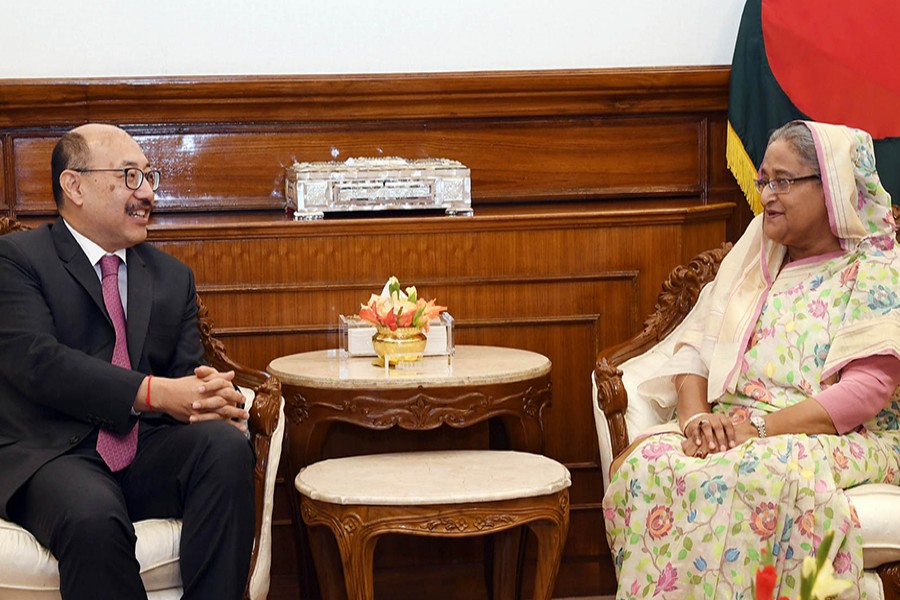Border fencing, countering cross-border terrorism, and Rohingya issues are likely to dominate the Bangladesh-India home minister-level talks, to be held in the capital on Sunday.
Indian Home Minister Rajnath Singh is going to arrive in the city today (Friday) on a three-day state visit. He will be accompanied by the officials of Indian home ministry and Border Security Forces (BSF).
Mr Singh will meet Prime Minister (PM) Sheikh Hasina tomorrow (Saturday), and will join his Bangladeshi counterpart Asaduzzaman Khan Kamal in the home minister-level talks.
Apart from cooperation in counter-terrorism operations, he will also discuss some other issues, including border fencing, preventing smuggling, and reducing border shooting, said the officials concerned.
During his meeting with the PM, the latest political situation in the run-up of the general election in Bangladesh as well as India's role in resolving Rohingya crisis will also come up, they added.
The Indian home minister will also inaugurate an Indian visa application centre at Baridhara, which will be the largest such centre in the city having 50 application counters.
Rajnath Singh will also visit Bangabandhu Memorial Museum and Dhakeshwari Temple in the capital.
In an effort to strengthen the relations between the police forces of Bangladesh and India, a memorandum of understanding (MoU) will be signed between Sardar Ballabh Bhai Patel Police Academy and Bangladesh Police Academy.
Rajnath Singh will also inaugurate the new building of Bangladesh Police Academy at Sharda in Rajshahi.
According to Indian media reports, India has decided to propose Bangladesh construction of "single-line high fences with anti-cut, anti-climb properties" along the border areas, which are yet to be fenced.
The proposal will be placed for discussion, as it is part of the Narendra Modi-led government's initiative to have the entire India-Bangladesh border properly fenced.
Nearly 300 villages, located on the zero line and within 150 yards of the international border, have been identified for such fencing, said the officials concerned.
The length of India-Bangladesh international border is over 4,096 km, of which 3,026 km is fenced.
The unfenced locations often fall in the riverine areas of the border or in village areas where land acquisition is difficult for the government, said a report published in Bharatshakti, a defence-related news portal of India.
The conventional three-line fence can be built beyond 150 yards of the border and on the Indian side, which needs more land.
On the other hand, the single-line fencing will come up within 150 yards of the international border, provided Bangladesh gives its assent.
As per the international law, there can be no construction within 150 yards of the border. So, for the fencing project, the consensus of Bangladesh government is needed, said a senior official of BSF.
"It will not need much land, and will be anti-cut, anti-climb modular fencing. There will be some special features. For this, we need approval from Bangladeshi government since the project will come up on the area falling under 150 yards of the international border," he said.
"For long, Bangladesh has been expressing concern over killing of Bangladeshi citizens in BSF firing at the international border. Following repeated complaints by the neighbouring country, India adopted a policy that BSF will use only non-lethal weapons along the India-Bangladesh border," the report added.
Meanwhile, UNB adds: Indian High Commissioner in Bangladesh Harsh Vardhan Shringla met Prime Minister Sheikh Hasina at her office on Thursday.
At the meeting, they mainly discussed the progress of the projects being implemented in Bangladesh with Indian cooperation, said PM's press secretary Ihsanul Karim while briefing reporters after the meeting.
The Prime Minister said Bangladesh and India witnessed a remarkable progress in the cooperation on different areas, particularly in the field of power and energy over the last nine years.
She said her government deeply appreciates Indian support and cooperation in the power and energy sectors and would like to explore more avenues of cooperation.
Sheikh Hasina expressed the hope that India would continue to cooperate with Bangladesh in ensuring energy security.
The Indian envoy informed the Prime Minister of the present state of power projects and their future plan. The two sides are discussing new power projects for subsequent export to Bangladesh, West Bengal and eastern part of India.
The Prime Minister said Bangladesh has allocated 1000 acres of land in economic zone for Indian investors where they, if wish, can set up LNG projects.


